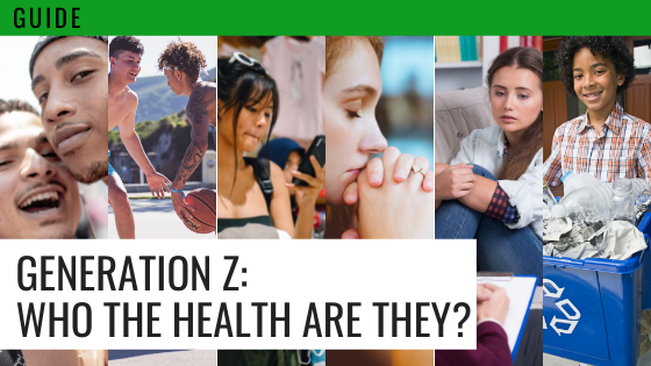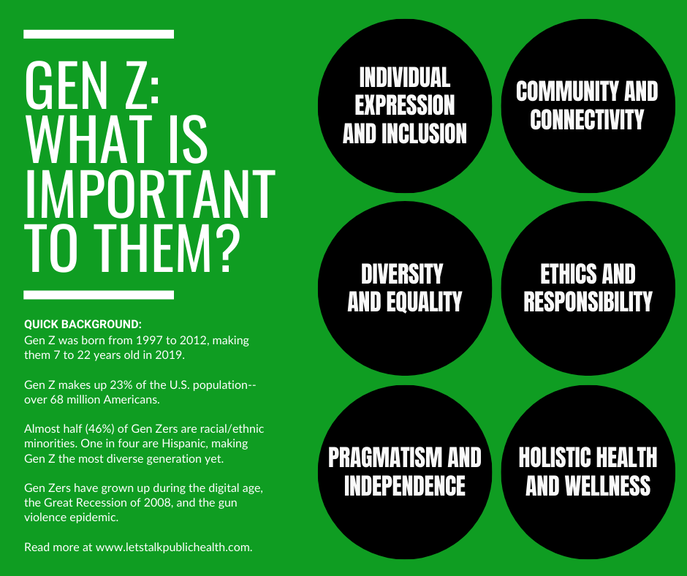Who is Gen Z?
According to Pew Research Center, Gen Z was born from 1997 to 2012, making them (in 2019) 7 to 22 years old. Gen Z makes up 23% of the U.S. population--that’s over 68 million Americans. Almost half (46%) of Gen Zers are racial/ethnic minorities (one in four are Hispanic), making this generation the most diverse yet.
Gen Z grew up during the age of mobile broadband and WiFi technology, mobile devices, mobile applications, and social media. While other generations (i.e., Baby Boomers, Gen X, and Millennials) had to adapt to these innovative technologies, platforms, and methods of accessing the internet, for Gen Z, these innovations were native. As such, Gen Z is accustomed to constant connectivity and the ability to access entertainment and information on-demand.
Gen Z also grew up during the Great Recession of 2008, which has made them more financially conservative. Additionally, Gen Zers have been all too familiar with gun violence, making them the most likely generation to report experiencing poor mental health and seeking treatment and therapy. What is important to Gen Z?
Community and connectivity. Nine in 10 Gen Z teens report having access to a computer or smartphone and using the internet multiple times per day or more. With the ubiquity of technology, there is less distinction between virtual and physical spaces. Over 25% of Gen Z respondents in one study reported seeing no difference between their online and offline selves. Gen Zers are connecting with their existing networks and building new connections online.
Diversity and equality. Gen Z is interested in equality, including race, gender and income. For example, Gen Zers, like Millennials, are more likely than older generations to to see increasing racial and ethnic diversity and allowing same-sex marriage as good things for society. White Gen Zers are also far more likely than whites of prior generations to say black people are not receiving fair treatment. Ethics and social responsibility. As a generation that mobilizes for a variety of causes, Gen Z wants the government to do more to solve social issues and expects brands to use ethical and socially responsible practices. Individual expression and inclusion. In one study, Gen Z respondents chose “open-mindedness” as their top generational trait. They are a generation that avoids labels and values gender fluidity. Thirty-five percent of Gen Z reports personally knowing someone who prefers to be referred to with gender-neutral pronouns. This is significantly higher than the percentage of Millennials and Baby Boomers who report knowing such a person. Additionally, half of Gen Zers feel like society isn’t accepting enough of non-binary individuals. Pragmatism and independence. Gen Zers are earning money at an earlier age, and have high entrepreneurial aspirations for the future. A common source of income for Gen Z is freelancing or a side-hustle. One study found that 47 percent of older Gen Zers (ages 18-21) freelance, and another study found that around 70% of teens are self-employed. What are Gen Z’s health-related attitudes, beliefs, values, and behaviors?
Gen Zers have a holistic view of health. They recognize how factors such as social and emotional wellness, sleep and stress affect their physical wellness. Balance is a primary health goal for this generation. And for teen Gen Zers, both feeling good and looking good are key indicators of good health.
Looking at each of the eight dimensions of wellness:
What does Gen Z want from healthcare?
What are Gen Z’s health outcomes?
From 2016-2017, 45% of adolescents (ages 12-17) had at least one chronic health condition; 25 percent had two or more chronic conditions.
By 2020, Gen Zers are estimated to comprise 40% of all U.S. consumers. They represent future leaders, both in public health and in general. Their influence on culture and industry warrants our attention and consideration. Understanding Gen Z can help public health to better prepare for future health issues, needs, resources, and solutions. The more we know about Gen Z, the better we can communicate and collaborate with them.
The data in this post are representative of Gen Zers in the US, unless otherwise noted (e.g., data from international or global samples). The trends included in this post may change as more research is conducted with Gen Z. Additionally, these trends are high-level, and may differ when examined by segments of the Gen Z population (e.g., specific racial/ethnic groups, ages, and geographic locations).
Last updated: January 6, 2020
0 Comments
Your comment will be posted after it is approved.
Leave a Reply. |
�
Learn about our blog submission guidelines. >>
The views and opinions expressed by individual authors on this blog are their own and do not necessarily reflect the official policy or position of Let's Talk Public Health.
Categories
All
|
|
Highlights
Explore
Connect
|
© 2024 Let's Talk Public Health, LLC. All rights reserved. | View our Privacy policy | Terms of service | Disclaimer | Editorial policy.



 RSS Feed
RSS Feed